- Beowulf & Other English Poems
- The Hitchhiker’s Guide To The Galaxy by Douglas Adams
- Roland Barthes by Graham Allen
- With A Tangled Skein by Piers Anthony
- Collection of Aristophanes’ Plays
- The Windup Girl by Paolo Bacigalupi
- Camera Lucida by Roland Barthes
- Empire of Signs by Roland Barthes
- Incidents by Roland Barthes
- Writing Degree Zero by Roland Barthes
- The Savage Detectives by Roberto Bolano
- Collected Fictions by Jorge Luis Borges
- High Druid of Shannara: Jarka Ruus by Terry Brooks
- High Druid of Shannara: Tanaquil by Terry Brooks
- The Path To The Nest of Spiders by Italo Calvino
- Six Memos For The Next Millennium by Italo Calvino
- Under The Jaguar Sun by Italo Calvino
- The Cambridge Companion To Chaucer
- Spray Paint The Walls: The Story of Black Flag by Stevie Chick
- The Hunger Games by Suzanne Collins
- Matched by Ally Condie
- Context-Further Selected Essays on Productivity, Creativity, Parenting, and Politics in the 21st Century by Cory Doctorow
- Makers by Cory Doctorow
- With A Little Help by Cory Doctorow
- Ten Plays by Euripides
- Discipline & Punish-The Birth of the Prison by Michel Foucault
- H.P Lovecraft: Against The World, Against Life by Michel Houellebecq
- Virgina Woolf’s Mrs. Dalloway: Invisible Presences by Molly Hoff
- The Odyssey by Homer (Butler translation)
- An Enquiry Concerning Human Understanding by David Hume
- Basrayatha: The Story Of A City by Muhammad Khudayyir
- New York Hardcore 1986-1991: A Time We’ll Remember by David Koenig
- Teaching Literature & Language Online (Edited by Ian Lancashire)
- Piers Plowman by William Langland
- The Postmodern Condition: A Report on Knowledge by Jean-Francois Lyotard
- Italo Calvino: A Journey Toward Postmodernism by Constance Markey
- Shakespeare’s Tragic Cosmos by McAlinden
- Utopia by Sir Thomas More
- Plato-Euthyphro
- Imaginative Qualities of Actual Things by Gilbert Sorrentino
- Wikinomics: How Mass Collaboration Changes Everything by Don Tapscott
- Civil Disobedience & Other Essays by Henry David Thoreau
- Look At The Birdie by Kurt Vonnegut
- Mother Night by Kurt Vonnegut
- The Sirens of Titan by Kurt Vonnegut
- The Death of the Moth by Virginia Woolf
NJCEA Presentation: The Gaping Garments of Electronic Literature
Here is my presentation from the annual NJCEA conference at Seton Hall. The Gaping Garments of Electronic Literature looks at how electronic literature has moved off the page and into the world around us. There is discussion of the works of Espen Aarseth, Jill Walker-Rettberg, Shelley Jackson, Roland Barthes, and more.
I posted the pdf as it stood when I read it at the conference. There may be citations missing, paragraphs crossed out, and parts where I go make lists to discuss in more detail in person. I wanted to preserve what I actually read that day.
As the summer goes on, I will post my notes from the different panels I attended at the conference.
Borges Presentation
I recently came across a printout of this: I only vaguely recall making this presentation, but this is my midterm presentation for Scott Rettberg’s seminar on postmodernism back in 2004 at Stockton. As you can see, I wrote my final paper on Borges. At this point, I was still putting the pieces of the puzzle in regards to Borges in general, semiotics, and especially Kristeva and Barthes.
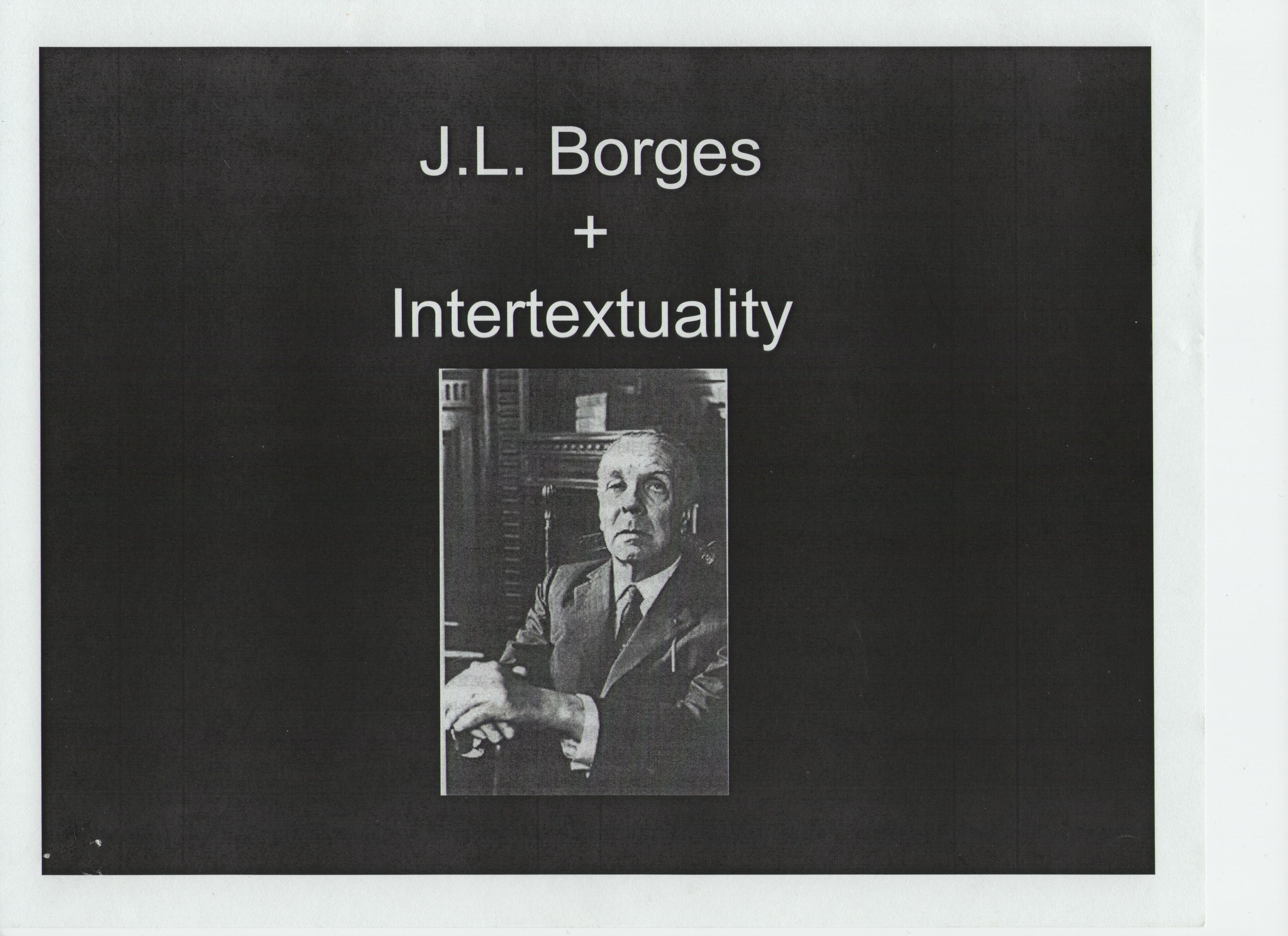
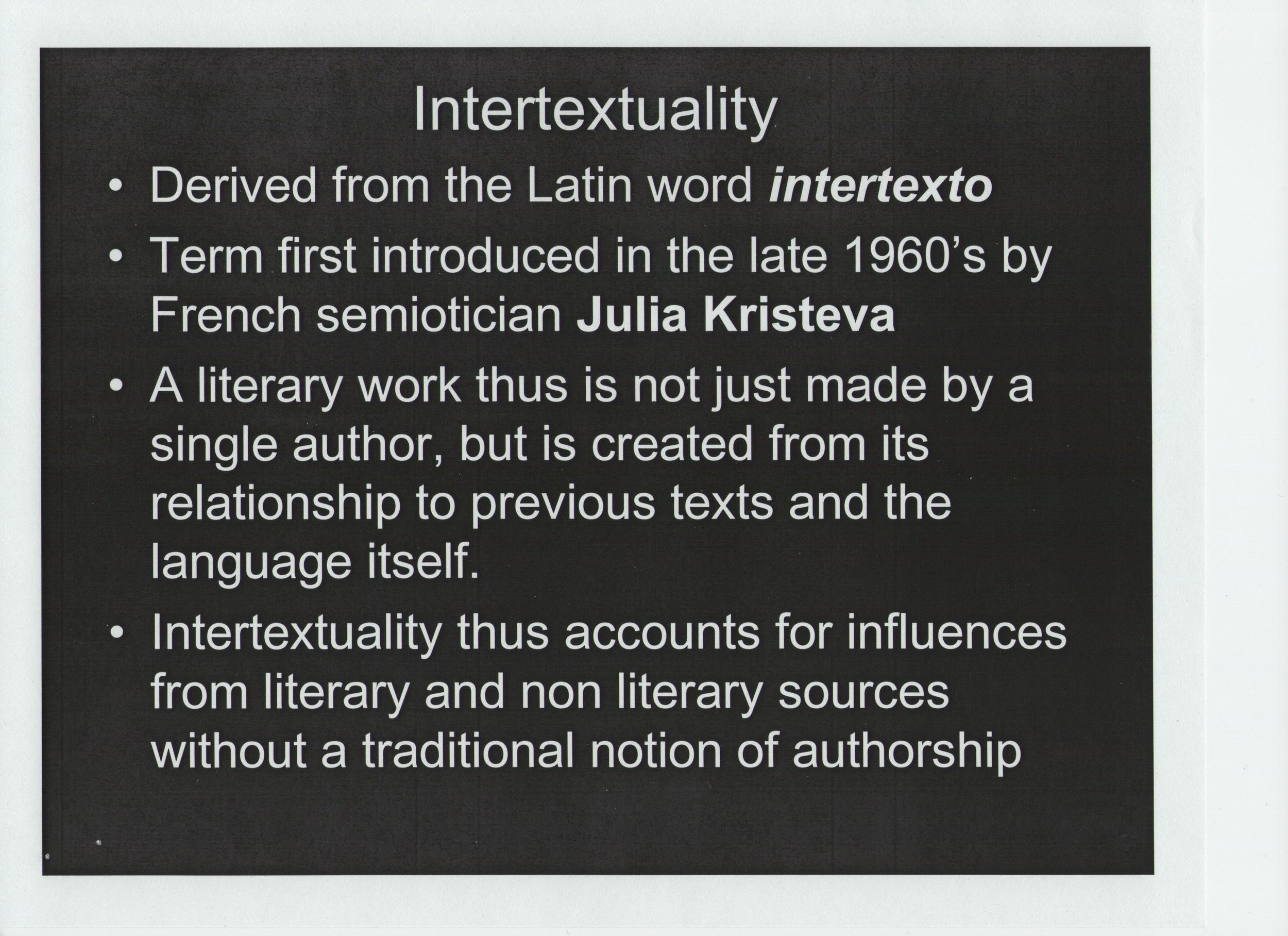
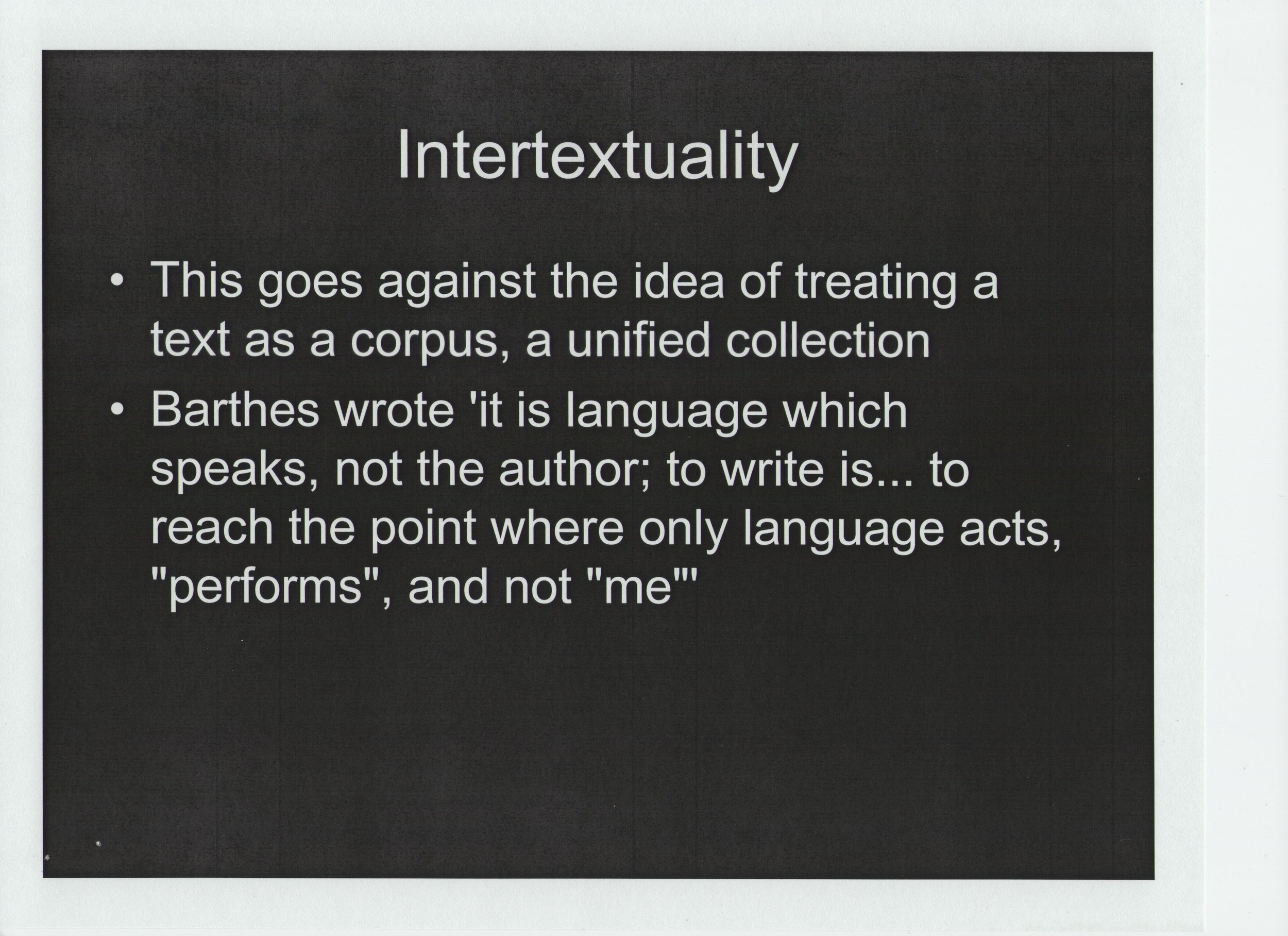
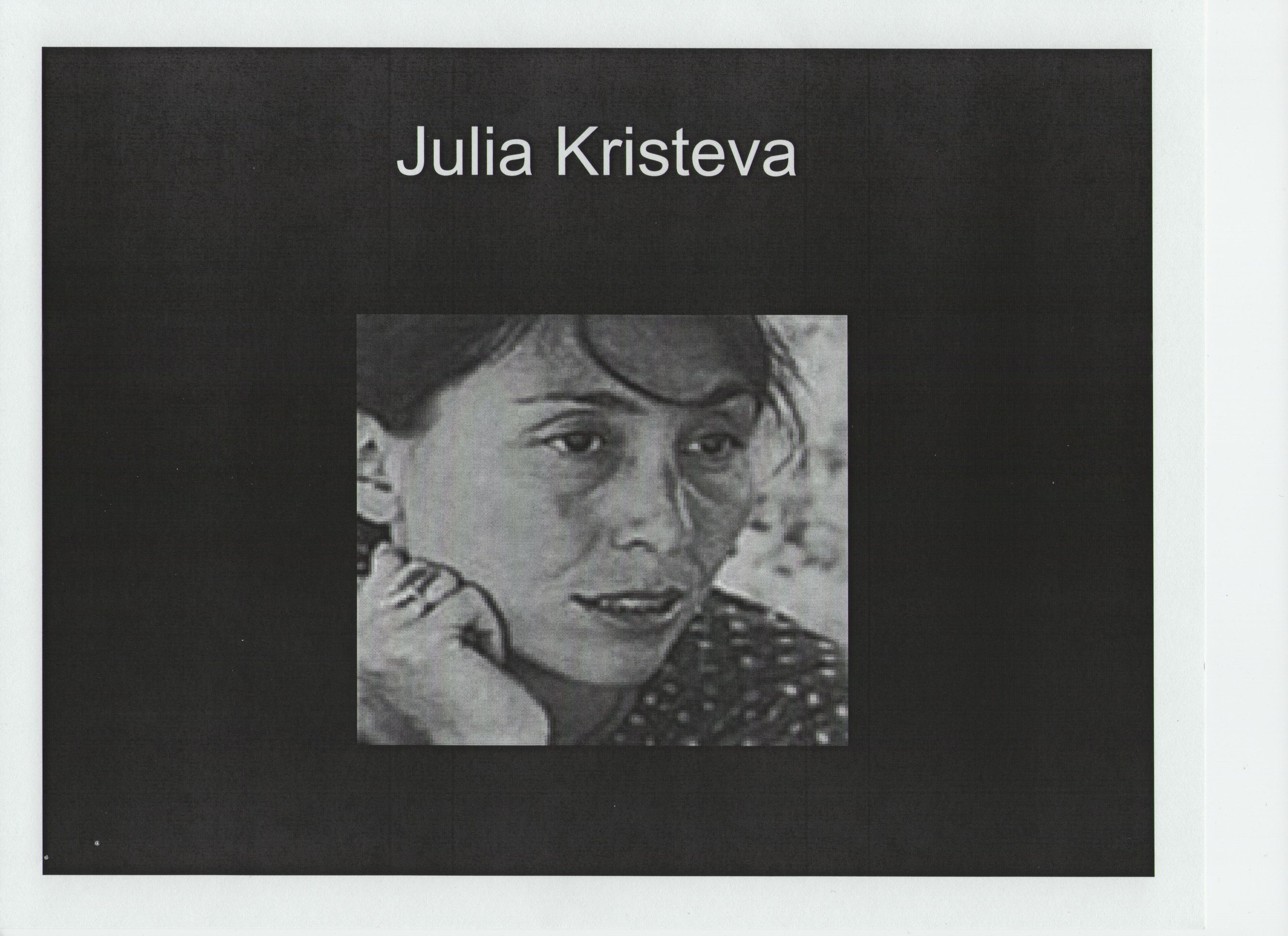
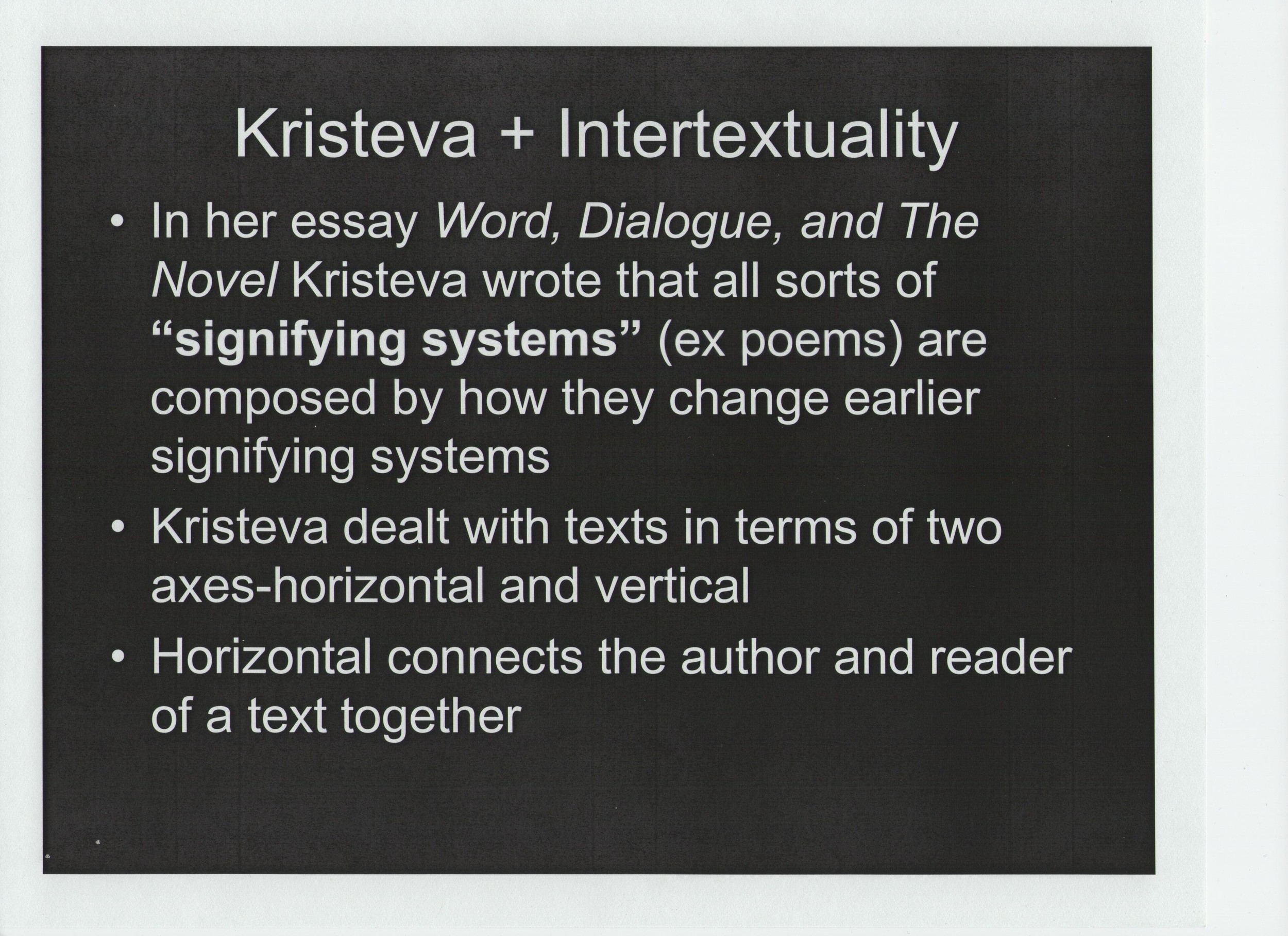
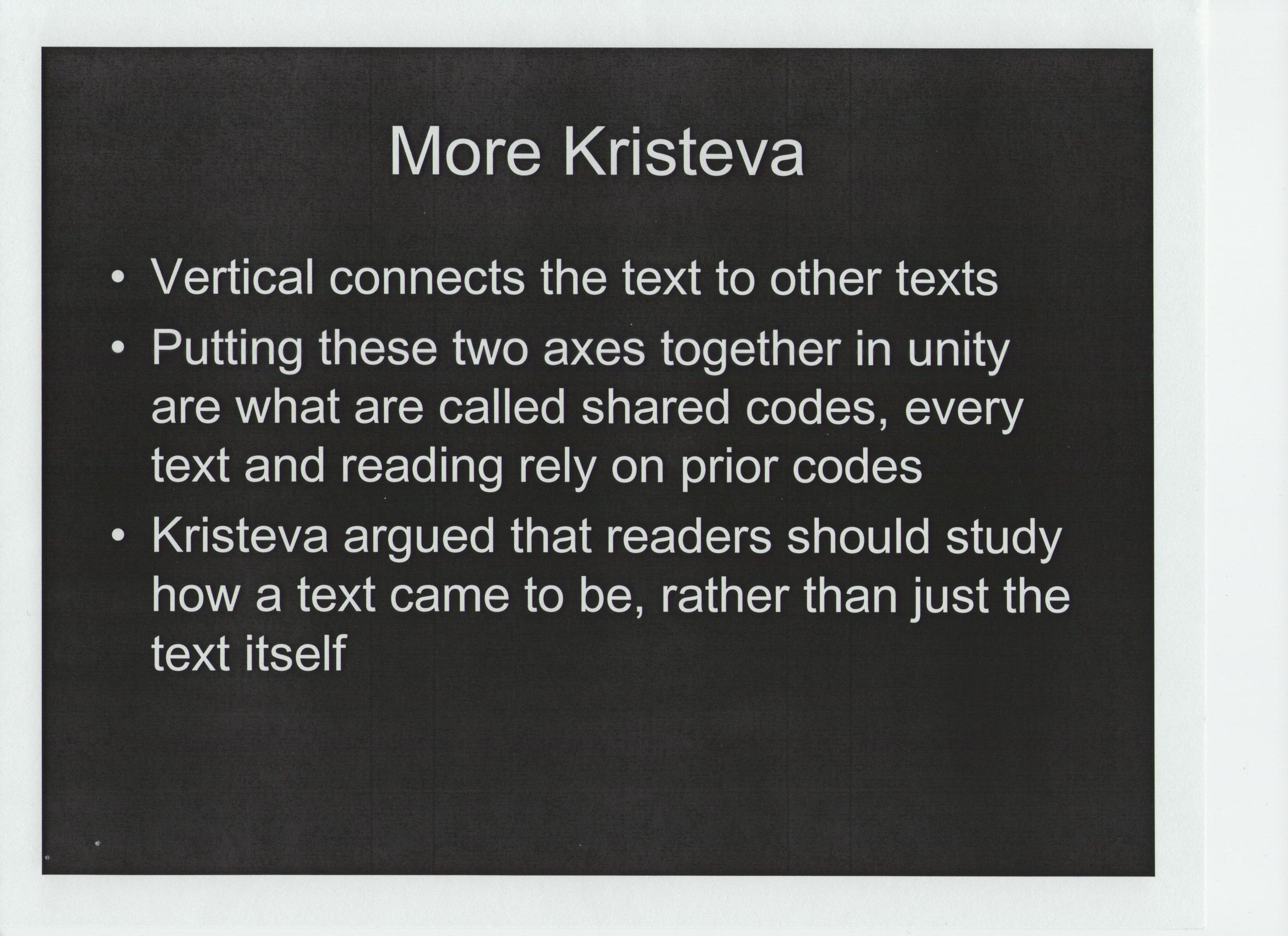
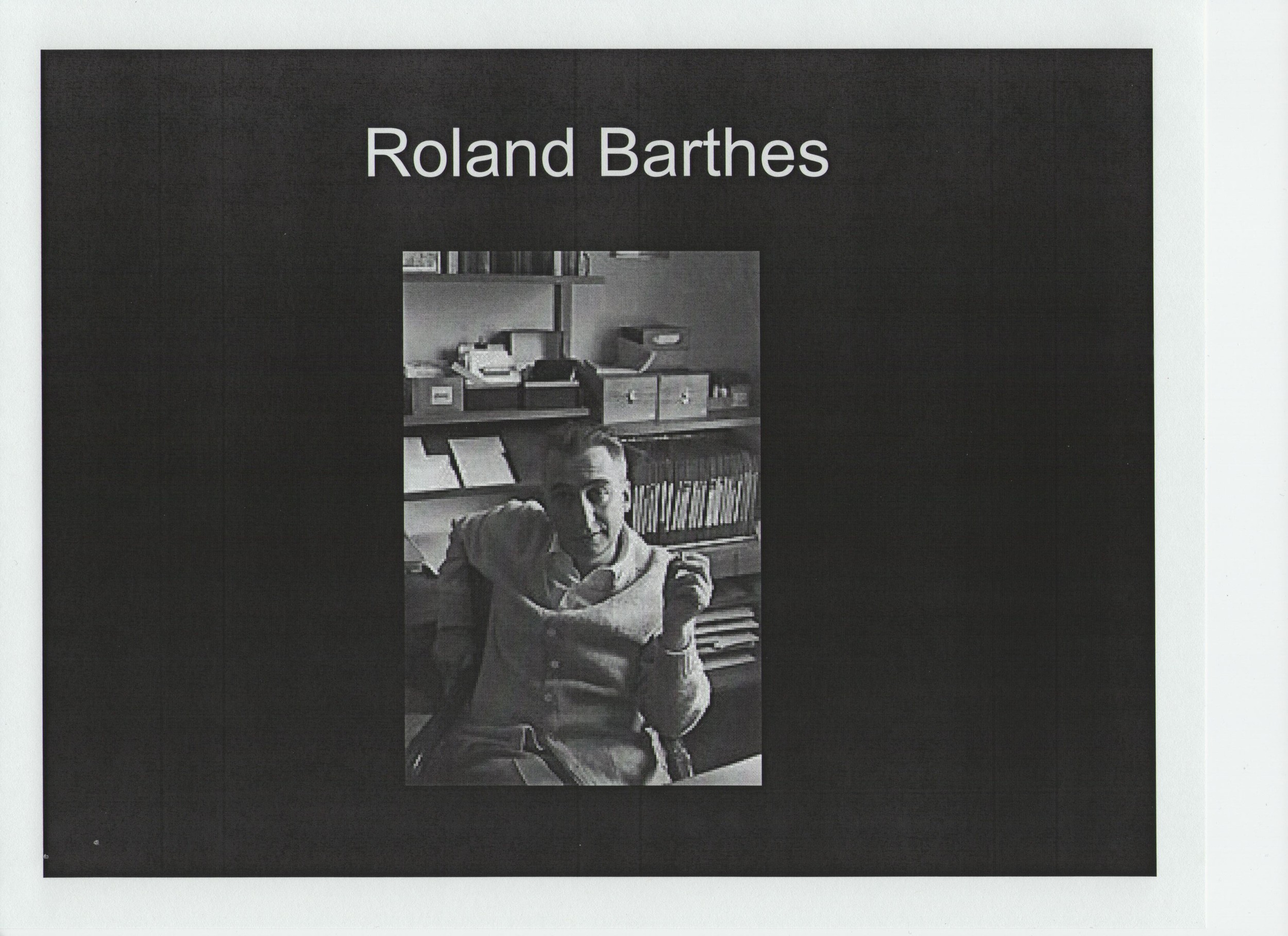
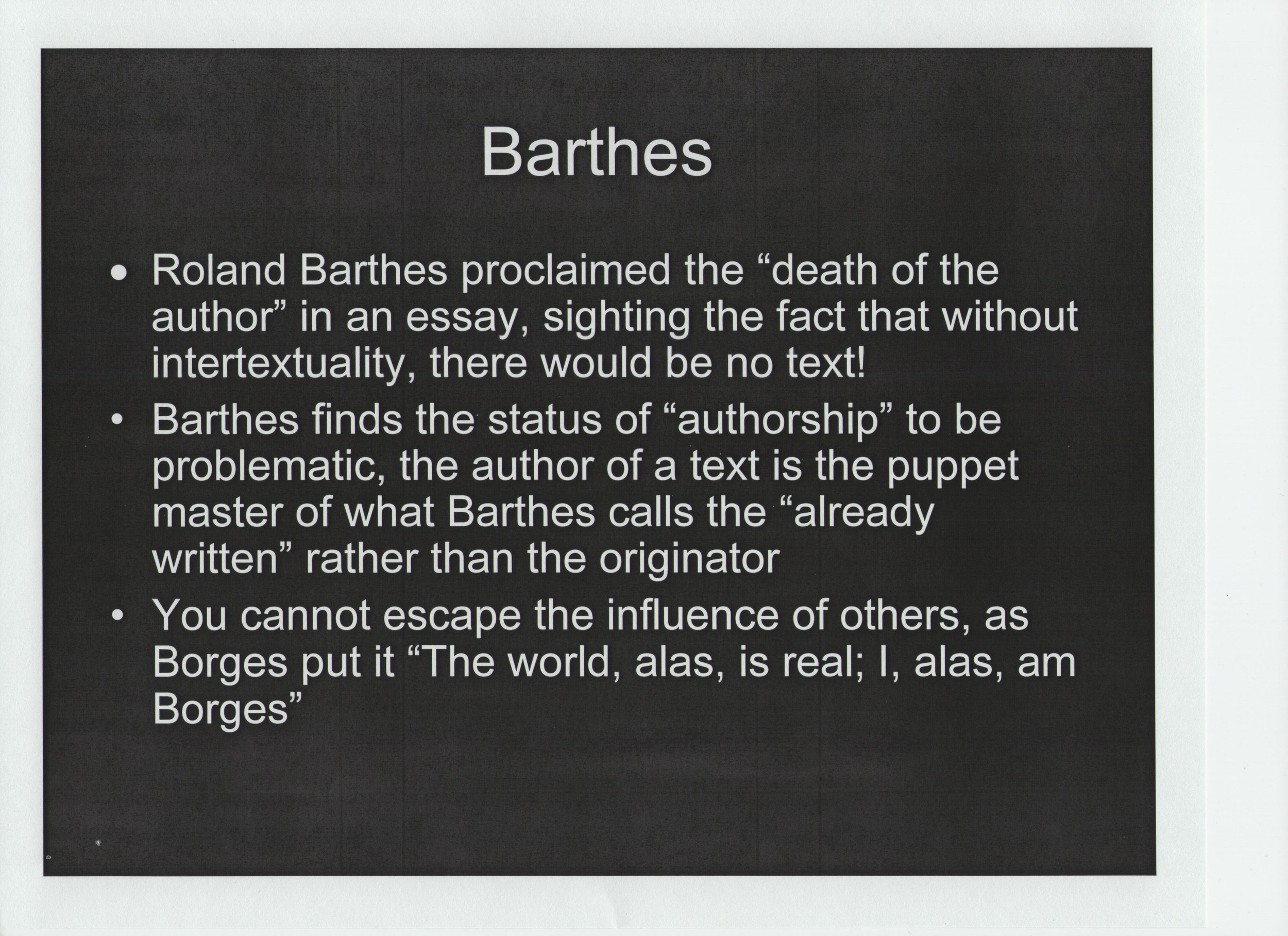
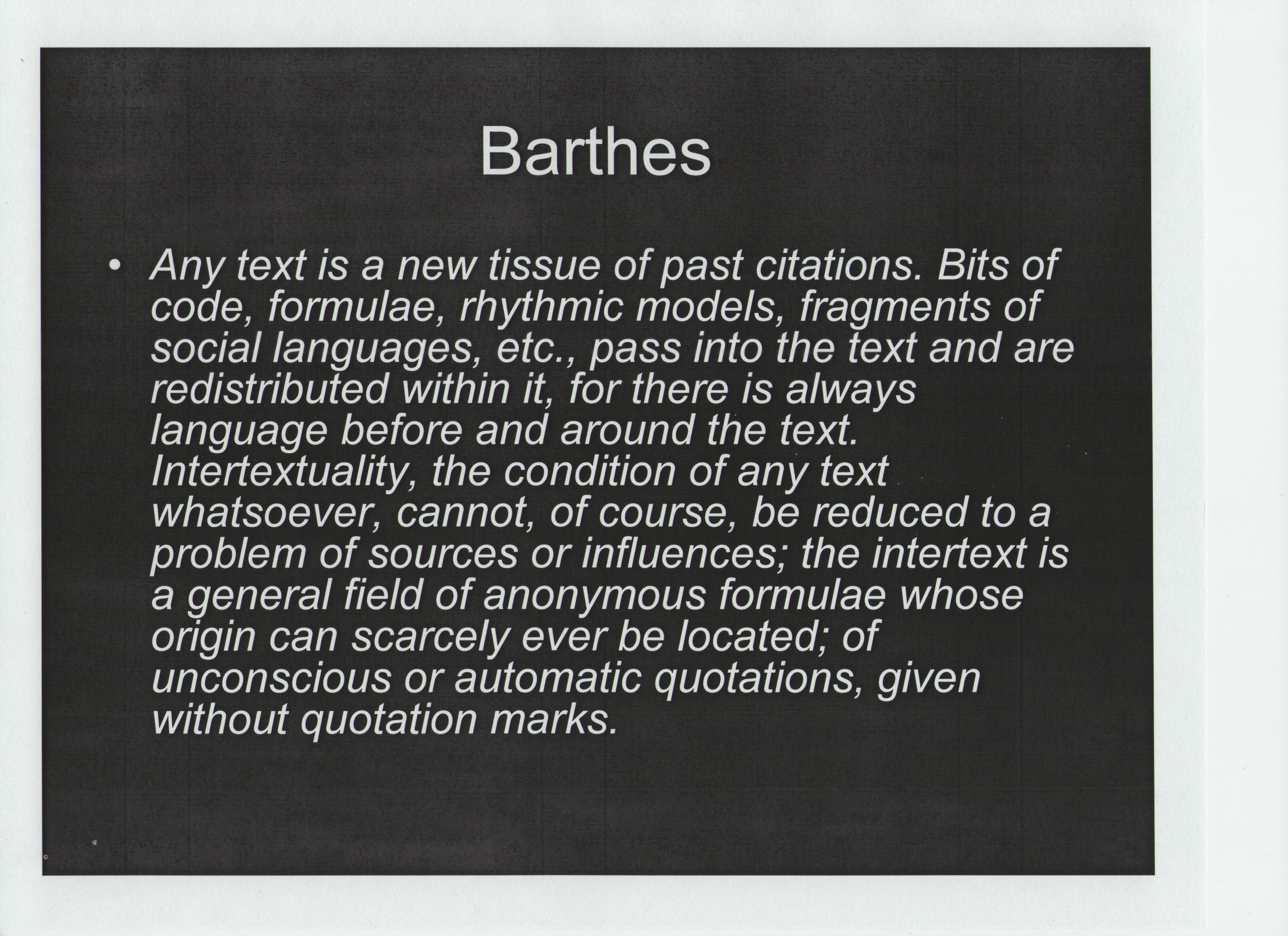
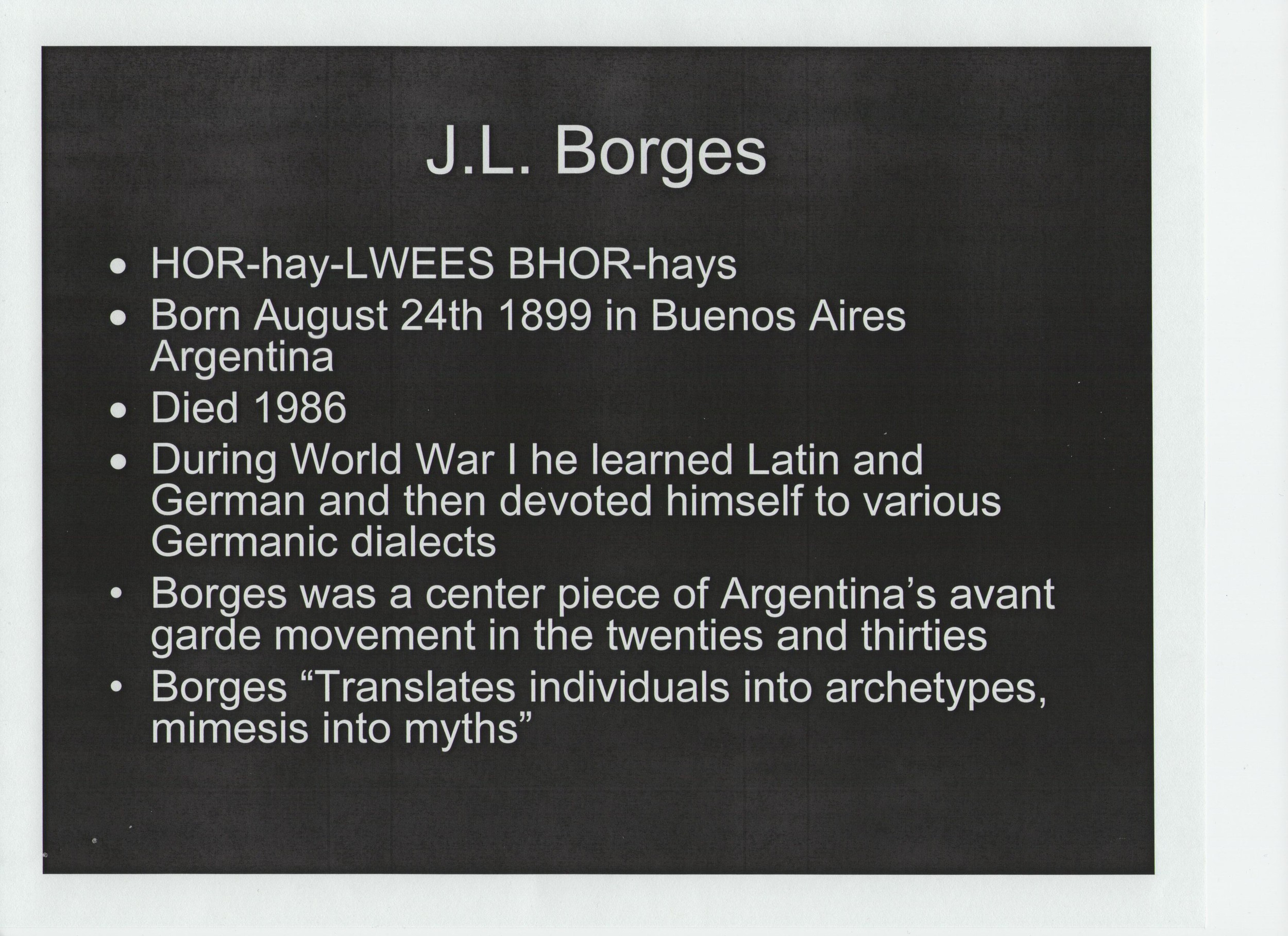

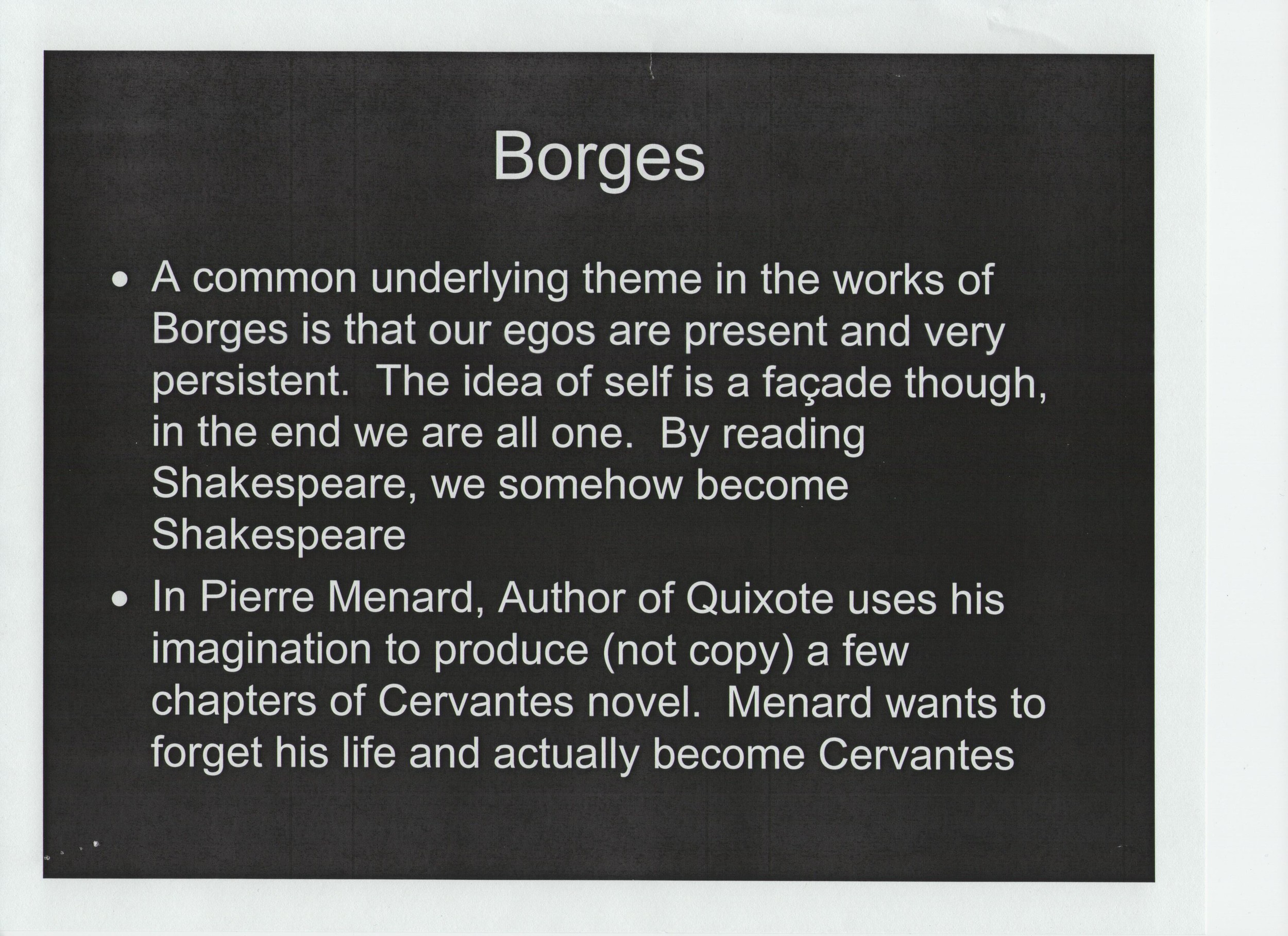
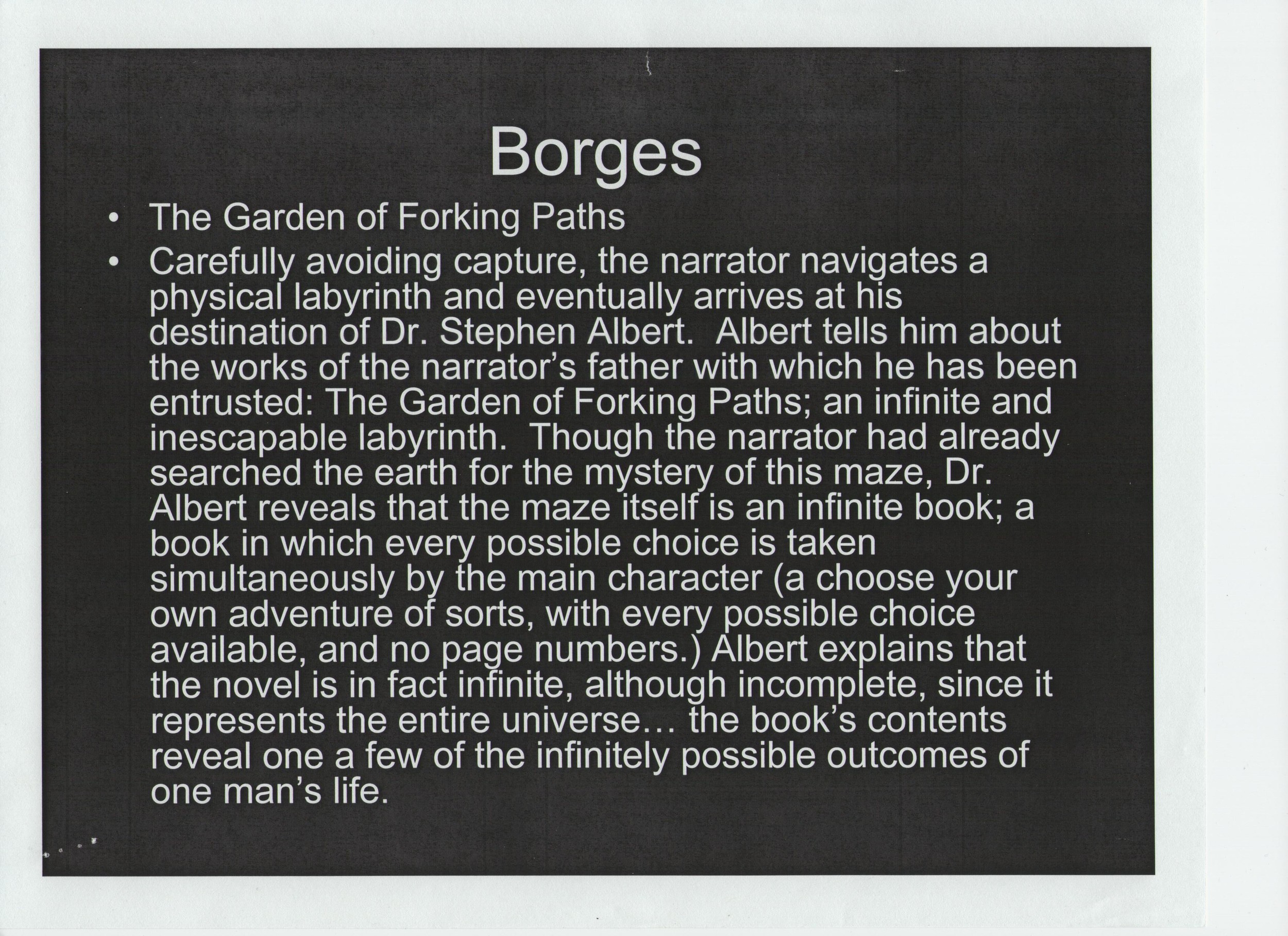
My Digital Humanities Origin
In its original draft, this was part of the introduction to my MA thesis. After some discussion, I ended up pulling this out to keep my thesis more focused on the matters at hand. I really like what I wrote here so I decided to excerpt it on my domain for my readers. I wrote this right around this time last year.
Everything I found in electronic literature upon discovery, the intellectual aesthetic and interplay with computers, which had been my cherished companion since childhood, I had been looking, searching, for in my literary studies. As a child I had played some text adventures, known as interactive fiction, and certainly remember their printed cousins the Choose Your Own Adventure book. I loved how interactive those books were and the agency which readers were given to decide their own fate and reading path. Growing up, I had a lot of problems with motor development and coordination. This led to many other problems including very poor penmanship. A wise teacher, when I was in elementary school, suggested my parents buy me a computer. She claimed that I would end up ahead of the curve because personal computers were going to takeover classrooms before I left for college. Wisely, my parents took her advice and purchased an Apple II for me to do my school work on and, because I did not play well with other children, to have an outlet for play and creativity.
Long before I became an avid reader in my teens, my creativity came almost exclusively from computers. Game designer Jane McGonigal’s recent weblog post about her experience creating detailed narratives out of Apple II games that did not already have them like Summer Games brought back memories from my own childhood. I had a similar experience at almost the same time by creating forms in a word processing program with different countries and names. I created brief backgrounds for each character and had them compete against each other on screen. Scandal, same gender romance, athletic achievement, and other intrigues played out in this interpretation of my gaming experience. I would not call that literature, obviously, but I tell this story to show how my creativity was electronically nourished before I embraced print culture later in my teens.
I have been on the Internet since sometime in early 1995. Immediately I became involved with participatory online culture by writing fan fiction, posting to newsgroups and listservs, chatting on Internet Relay Chat (IRC) and, on and off, creating journals which nowadays would be called a weblog. At the same time, I published print based punk rock fanzines periodically until 2005 when I began Signifying Nothing, a webzine, archive of my earlier fanzines, and podcast devoted to my endeavors in hardcore punk which continue to this day.
My interest in electronic literature came to fruition while taking a senior seminar on postmodernism with Scott Rettberg in the spring of 2004. While being turned onto writers like Italo Calvino, John Barth, Jorge Luis Borges, and theorists like George Landow, Roland Barthes, and Julia Kristeva I realized that not only were these fiction writers exactly what I had longed for all of my life from literature, but the bridge between literary theory I fell in love with from Kristeva and Barthes, which I had struggled with until this time, and computers which Landow and others like Rettberg himself bridged via their theories was a dream come true. The beginning years of my college career were filled with frustration, failure, and difficulty. The first step of my recovery came when I embraced electronic literature.
Reading hypertext fiction and the theories of Barthes and Kristeva in Rettberg’s seminar improved my readings of previously read authors like Faulkner, Woolf, and Wallace. I began researching electronic literature and exploring the links on Rettberg’s weblog. Through these links I was able to explore the work of other hypertext and New Media theorists like Nick Montfort, Angela Thomas, and Jill Walker. I experimented with and clicked through Rettberg’s hypertext novel, The Unknown, and began actively participating in the sticker novel he authored with Montfort. As the semester wound down, two classmates and myself began our own weblogs, inspired with Rettberg and Walker especially, and I moved mine to its own domain later that summer.
Since the rise of the novel the past few centuries have had some hypertextesque works of literature. Novels like Tristram Shandy, Infinite Jest, and Ulysses can seem to those familiar with the workings of electronic literature to have qualities which “stand out for the first time.” (Landow 1982) When I read Sterne’s novel in an undergraduate course on the history of the novel, I came in one morning and remarked to my professor that the novel had a lot of the qualities of hypertext fiction which I was learning about in Rettberg’s seminar on postmodernism the same semester. Without knowledge of electronic literature I would have never made the connection, which made my reading of Sterne’s novel much more pleasurable. Experimental works of literature like Pavic’s Dictinary Of The Khazars and Nabakov’s Pale Fire also exude qualities which are emphasized by an understanding and familiarity with hypertext and electronic literature.
As Janet Murray argues in Hamlet On The Holodeck: The Future Of Narrative In Cyberspace, “the impending dissolution of Yugoslavia,” in Dictinary Of The Khazars, “is preconfigured by the fragmentary account of a mythical lost tribe” of three separate, conflicting, dictionaries (Murray 37). The “multicursally” seen in Pale Fire has been seen as a branch between not only modernism and postmodernism but as a text that has hypertextesque qualities (Aarseth 8). Writers like Robert Coover, a longtime advocate of electronic literature, Borges, and other postmodernists from France and South America also write literature which embodies many aspects of hypertext fiction.
The Pleasure Of The Text
The other afternoon, I was discussing French theorist Roland Barthes' spectacular The Pleasure Of The Text with a friend. This short book is probably my favorite work of literary theory. It combines semiotics with a grand discussion of texts and their intermittent nature. As with most of Barthes' work, it is also about numerous other things. In this case, it is romance and sexuality which seems to come up occasionally. Barthes, rumored to be asexual himself, discusses romance and sexuality in the same terms that he discusses texts. Both are a jangled web of connections and intermittent ideas, never showing too much but always indicating there is something more hidden beneath.
Anyhow, one quote from near the beginning of the book has stayed with me since I finished my reading. This quote sums up how I feel about a few different things:
Is not the most erotic portion of a body where the garment gapes? In perversion (which is the realm of textual pleasure) there are no “erogenous zones” (a foolish expression, besides); it is intermittence, as psychoanalysis has so rightly stated, which is erotic: the intermittence of skin flashing between two articles of clothing (trousers and sweater), between two edges (the open-necked shirt, the glove and the sleeve); it is this flash itself which seduces, or rather: the staging of an appearance-as-disappearance. (10)
The Multiplicity Of Discursive Elements
My first semester of graduate school, one of the courses I took was on Critical Theory with Dr. Bluemel. As we went from theorists as varied as Eve Sedgwick, Stanley Fish, and Roland Barthes I noticed a pattern forming during our discussions. A number of my contributions to the discourse were referential to not only outside sources, but even some outside of what is normally considered “literature” by most students. My professor told me to try to stay within the bounds of literature in order to not lose or confuse other students, which was fine by me. Still, I was troubled that I received blank stares from my classmates when bringing up David Hume, John Dewey, or even a popular contemporary like Zadie Smith. I had an extremely hard time trying to stay “in bounds” which it came to our classroom discourse.
In History Of Sexuality, while discussing the unity of power and knowledge in discourse, Foucault offers this definition of discourse:
We must conceive discourse as a series of discontinuous segments whose tactical function is neither uniform or stable. To be more precise, we must not imagine a world of discourse divided between accepted discourse and excluded discourse, or between the dominant discourse and the dominated one; but as a multiplicity of discursive elements that can come into play in various strategies (100).
As an undergraduate, I took a number of extra courses to attain a minor in Philosophy. I did this in order to supplement my literary studies. What I learned from Dewey, Hume, Nietzsche, Arthur Danto, and others went with me back to the English classroom to accentuate my work there. Perhaps this is why theoretical concerns are more compelling to me than the standard close reading associated with English, but I see no reason for not extending into other fields for further enlightenment and thought. Just talking about English in English classes bores the hell out of me.
Fall 2007 Annotated Symposium Notes
I have created an annotated version of my presentation at Hypothesis?, the first ever Monmouth University English program symposium (which I organized with Toni Magyar). My presentation was titled Remixing The Canon: Electronic Literature & Distributed Narratives. After defining and offering examples of various forms of New Media and electronic literature I discussed the most recent evolutions in Barthes’ writerly text, including what Jill Walker-Rettberg has termed distributed narratives. I call for a look at “remixing” the canon to be more inclusive of electronic literature due to their often literary tone. The primaries examples I use comes from authors like Caitlin Fisher, Scott Rettberg, Nick Montfort, and Shelley Jackson. (PDF)